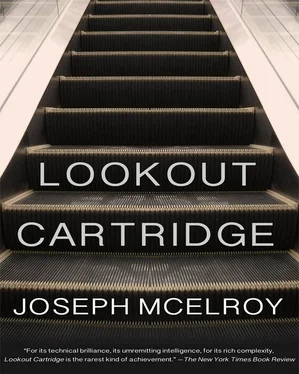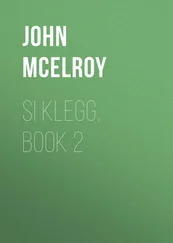Joseph McElroy - Lookout Cartridge
Здесь есть возможность читать онлайн «Joseph McElroy - Lookout Cartridge» весь текст электронной книги совершенно бесплатно (целиком полную версию без сокращений). В некоторых случаях можно слушать аудио, скачать через торрент в формате fb2 и присутствует краткое содержание. Год выпуска: 2014, ISBN: 2014, Издательство: Dzanc Books, Жанр: Современная проза, на английском языке. Описание произведения, (предисловие) а так же отзывы посетителей доступны на портале библиотеки ЛибКат.
- Название:Lookout Cartridge
- Автор:
- Издательство:Dzanc Books
- Жанр:
- Год:2014
- ISBN:9781941088036
- Рейтинг книги:3 / 5. Голосов: 1
-
Избранное:Добавить в избранное
- Отзывы:
-
Ваша оценка:
- 60
- 1
- 2
- 3
- 4
- 5
Lookout Cartridge: краткое содержание, описание и аннотация
Предлагаем к чтению аннотацию, описание, краткое содержание или предисловие (зависит от того, что написал сам автор книги «Lookout Cartridge»). Если вы не нашли необходимую информацию о книге — напишите в комментариях, мы постараемся отыскать её.
Lookout Cartridge — читать онлайн бесплатно полную книгу (весь текст) целиком
Ниже представлен текст книги, разбитый по страницам. Система сохранения места последней прочитанной страницы, позволяет с удобством читать онлайн бесплатно книгу «Lookout Cartridge», без необходимости каждый раз заново искать на чём Вы остановились. Поставьте закладку, и сможете в любой момент перейти на страницу, на которой закончили чтение.
Интервал:
Закладка:
The man lifting two cups turned and said, Shut up, Jerry, and sloshed tea onto the floor. He grinned. I said, Jerry you’ve got principles.
Jerry said to our host, I’ve seen you put in your pretty contacts and go off to work as happy as…
I asked Jerry if he could get me an appointment with Aut.
I never go near him. I don’t even know where his office is.
The door wasn’t bolted.
If someone was busting into Sub’s looking for more diary pages, at least they wouldn’t find Sub or Ruby or Tris.
I got the door open. The boy took a drag on his joint. A bit close, I said. The boy said what did I mean I got confused when they were typed up, and the man said Hey your tea.
I said my daughter in London made a carbon usually, if she was doing the typing, so I sometimes thought of all those pages doubled.
The man with the metal-rimmed glasses had stopped but now moved my way again. He said, Your pages. Just take your cup, I’ll get them.
I said no thanks, I knew them.
What did I come down here for, then? the man was saying as he bent over to put the cups on the floor.
I was going to be detained. I couldn’t tell how clear the boy was.
I said, I don’t know much yet that’s going on here but I know we haven’t been disagreeing about Freestyle, or perforation, or magnetic stripe, or price, and I know that — to quote myself again — I have no wish to engage the boss’s wife in conversation about Dagger and me, but you tell your boss Mr. Phil Aut that whether or not he foots our gas from London to Ajaccio and back, it will be of interest to deal directly with me.
I was taking the stairs two at a time and steps came after but then stopped, then started, but far off.
I called up, I want you to explain your camera track to me.
He’d said it was not really what he was into. There had been something genuine up there, but nothing to do with my diary pages, which were also genuine. That music from Hair that Lorna used to play and play had stopped.
I was back on the street. Warehouse space, light industry, and in the area more and more artists, filling space, displacing industry.
Did the man in glasses know the name Monty Graf? If so he probably didn’t know that I had six hours till that appointment.
A girl in jeans with a knapsack came along looking up at the buildings as if for something in one of those loft windows. She was smiling, like a blind person or as if she knew something good. My neck itched but I wouldn’t find a chemist’s this far south of the Village and north of Canal. Lorna’s packing had been flawless, of course, but the Wilkinson dispenser was empty of new blades and the one in my razor was ready to be retired. When I visited the Wilkinson lab in Newcastle I asked a young engineer in a long white coat if the profit motive might not lead Wilkinson to relent and make a blade that didn’t last so incredibly long. He said this was not a prime concern.
Wilkinson want their American people resident.
My only mistake had been to mention Cosmo just now. That was giving too much away. I didn’t know if the Indian had mentioned my visit to the Knightsbridge gallery.
And the mistake seemed then doubled by my having sent that Empire State 3-D yesterday to Cosmo, who knew we weren’t friends.
Well where had I seen the Indian before?
And why should Claire care if I’d put in writing what the man looked like who came running out of the grove in Wales?
What I wanted was not a trip to Wall Street but a cheeseburger and a malted and the early afternoon edition of the Post.
SLOT INSERT
Witness a different cartridge: not a thing solidly instated in a slot, rather a slot inserted in a thing.
What happens? Shift a something to make room for an emptiness.
This slot, then — has it identity unfilled? Maybe only so. I.e., if as appears to be true this slot is, say, the place where (not to be too specific) motives for making the DiGorro-Cartwright film can be found, isn’t it true that when these appear in the slot thus filling it or causing it to cease to be empty, it thus ceases to be itself?
What appear to be such motives? Each one, as it fills the inserted slot, is also transparent. Through the motive may be seen the lack it is aimed to fill, as if the motive were a picture thrown not upon a screen but upon a volume, the motive thus even in its nagging transparency quite whole and plastic. A slot if like this one insertable is not only a place for a cartridge, and where inserted this slot is a cartridge of the future, of unknowns, or the unknown.
Are these statements themselves slots obscuring what’s in them?
Forget the slot and give it content. One motive for doing the film was that an American named Constance had been told in so many words that the film was in fact projected. Another motive was that the partners both and each thought it high time to get something together. A third was to mingle England and America. A fourth was to permit accident, say a couple of pompous hippies swapping recipes for gelatin dynamite, but no joke, as Will did not quite see when he suggested a New York tycoon blowing up his own building to collect the insurance.
For years it was possible to bring back to Lorna, Will, and Jenny American gifts. These can be recalled like a roll of events reminding one that three-dimensional Scrabble predated lie-dye jean jackets, and Peter, Paul, and Mary came after the new ultra-thin polyester sandwich bags sticky with static electricity. Bring back a memory Jenny snidely said, but it was often a future. If America was to popularize the universe she must be given a chance.
There was indeed one motive unvoiced to pragmatical Dagger. This was that the film under the guise of documentary daydream (and early associated with the chance that Chaplin might appear in an interview) would express some way two decades of America. The Bonfire in Wales threw into contour this possibility — here, for instance, the trend toward eastern modes, organic community, dislodging from city. The Unplaced Room, which of course had not been Dagger’s contribution, could show the American’s increasing disjunction in his environment and the need and arresting capacity to assert an existence and a self in a departicularized setting; it would be helpful to insert into such a setting Americans; and Dagger, even had he intended to, could not have made an apter contribution to this Unplaced Room than the unknown deserter who came with his friend and talked for several minutes. The Hawaiian-in-the-Under-ground playing his guitar would help to include race, national integrity, and the signal sweep of new folk musics and all they have been able, even unable, to express, Dylan and Mitchell and Newman and Stills. Hints here and there that the film was originating somehow outside America served to cool the focus.
Motives that did not get voiced to Dagger included, for instance, the power of spoken words to make even more magical the merest objects of daily life — seen, say, in the scene designated Suitcase Slowly Packed: the laying of a black Marks and Spencer sweater upon a white-and-green plastic bottle of medicated shampoo, the insertion and removal of hands, the documentary account of each thing given in one voice as Dagger wished against his partner’s alternative but impracticable plan that each thing going into the one gray case go with a new voice to live distinct and separate, though Dagger, as he assured his partner and his partner’s son one day in the park, would not automatically say no to any idea.
One summer there was one gift for the whole family from America — the one and only lost Cartwright family flick found in a large Whitman sampler — for God’s sake take it, my mother had said, the kids might enjoy it.
Читать дальшеИнтервал:
Закладка:
Похожие книги на «Lookout Cartridge»
Представляем Вашему вниманию похожие книги на «Lookout Cartridge» списком для выбора. Мы отобрали схожую по названию и смыслу литературу в надежде предоставить читателям больше вариантов отыскать новые, интересные, ещё непрочитанные произведения.
Обсуждение, отзывы о книге «Lookout Cartridge» и просто собственные мнения читателей. Оставьте ваши комментарии, напишите, что Вы думаете о произведении, его смысле или главных героях. Укажите что конкретно понравилось, а что нет, и почему Вы так считаете.












